|
Shepherds of Christ |
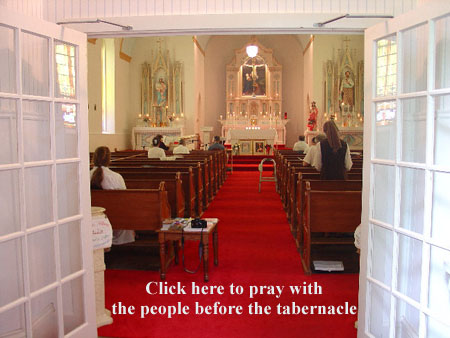 |
February 5, 2011
February 6th Holy Spirit Novena
Scripture selection is Day 9 Period I.The Novena Rosary Mysteries
for February 6th are Joyful.
Florida
Retreat
February 2nd - 5th
1:30pm and 6:20pm
Please tune in!
We need funds to send a
card advertising Fr. Joe's
homily book to the priests
in California, Texas, Chicago,
Boston and Mass
Can you please help?
Call 1-888-211-3041.
We received a new batch of
statues -
Sacred Heart and Immaculate Heart of
Mary
Padre Pio, Our Lady of Mt. Carmel,
Our Lady of Lourdes, Infant of Prague and more!
Call Doris
1-888-211-3041
Can anyone please help us payoff
our loan on the building?
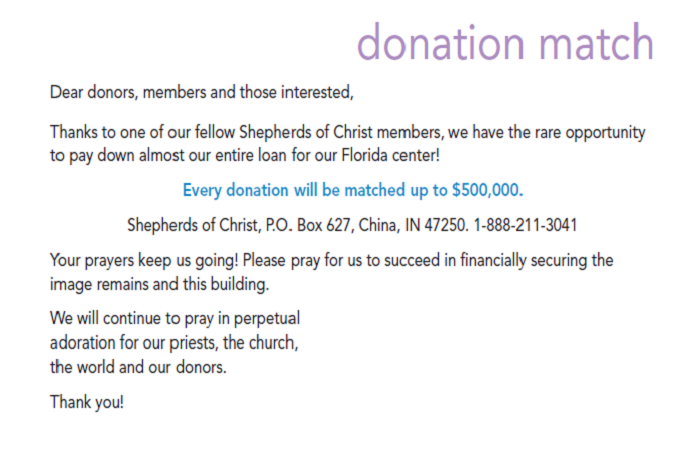

Please pray for Jimmy.
Pray for grace and funds.
February 5, 2011
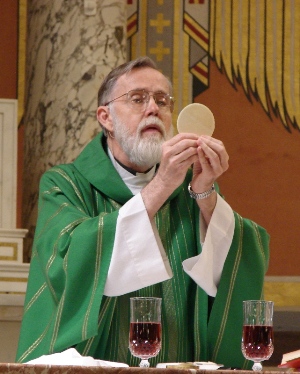
5th Sunday in Ordinary Time
Isaiah 58: 7-10
Is it not sharing your food with the hungry,
and sheltering the homeless poor;
if you see someone lacking clothes,
to clothe him,
and not to turn away from your own kin?
Then your light will blaze out
like the dawn
and your wound be quickly healed over.
Saving justice will go ahead of you
and Yahweh’s glory come behind you.
Then you will cry for help
and Yahweh will answer;
you will call and he will say, ‘I am here.’
If you do away with the yoke,
the clenched fist and malicious words,
if you deprive yourself for the hungry
and satisfy the needs of the afflicted,
your light will rise in the darkness,
and your darkest hour will be like noon.
Psalm 112: 4-9
For the honest he shines as a lamp in the dark,
generous, tender-hearted, and upright.All goes well for one who lends generously,
who is honest in all his dealing;
for all time to come he will not stumble,
for all time to come the upright will be remembered.
Bad news holds no fears for him,
firm is his heart, trusting in Yahweh.
His heart held steady, he has no fears,
till he can gloat over his enemies.
To the needy he gives without stint,
his uprightness stands firm for ever;
his reputation is founded on strength.
1 Corinthians 2: 1-5
Now when I came to you, brothers, I did not come with any brilliance of oratory or wise argument to announce to you the mystery of God. I was resolved that the only knowledge I would have while I was with you was knowledge of Jesus, and of him as the crucified Christ. I came among you in weakness, in fear and great trembling and what I spoke and proclaimed was not meant to convince by philosophical argument, but to demonstrate the convincing power of the Spirit, so that your faith should depend not on human wisdom but on the power of God.
Matthew 5: 13-16
‘You are salt for the earth. But if salt loses its taste, what can make it salty again? It is good for nothing, and can only be thrown out to be trampled under people’s feet.
‘You are light for the world. A city built on a hill–top cannot be hidden. No one lights a lamp to put it under a tub; they put it on the lamp–stand where it shines for everyone in the house. In the same way your light must shine in people’s sight, so that, seeing your good works, they may give praise to your Father in heaven.
5th Sunday in Ordinary Time
February 6, 2005
– (Isaiah 58:7-10, 1 Corinthians 2:1-5, Matthew 5:13-16) Ancient Babylon was in modern day Iraq, with its capital on the Euphrates River, less than 100 miles south of Baghdad. When the Babylonians conquered the Jews in 587 BC, they took most of the Jews off to Babylon as prisoners and slaves. This event, known as the Babylonian exile, lasted 50 years. When the Persians, people who lived in modern day Iran, conquered the Babylonians, the Persians allowed the Jews to return home. Most of those Jews who returned to Israel were the grandchildren of the ones who were taken into exile. When they got home to Israel, they found their cities and farms in the same deplorable state in which they had left them when they were originally conquered 50 years earlier. They had to rebuild everything, their farms, their homes, their businesses, their cities, their temple. And here is where our first reading comes in. Their efforts to survive created deep division in the community. It was survival of the fittest, and the poor and homeless were ignored. God is telling them that their selfish, self-centered, ‘every man for himself’ attitude was not going to be successful. If they wanted to grow and thrive, they had to start caring about each other. Justice, fairness, honesty and kindness would bring light into their darkness. Selfishness would bring continued suffering.INTRODUCTION
HOMILY
– The words of Isaiah are as true now as they were 2500 years ago. We can make our world beautiful by the way we treat each other or we can make it a very unpleasant place to be. If everyone’s only concern is about themselves, the survival of the fittest, few will survive and not very happily. If we work together, we will do more than survive, we will thrive. As Ben Franklin said at the signing of the Declaration of Independence: “We must all hang together, or assuredly we shall all hang separately.” And Jesus, as he continues the Sermon on the Mount, tells us “you can do it.” “You are the salt of the earth. You are the light of the world.” When we think of salt, we think of how it makes our food taste better, but we better not eat too much of it. It’s a pretty cheap item in our world today, but at the time of Jesus it was a very valuable commodity. So valuable in fact that the word “salary” comes from the Latin word for salt: “sal.” In those days it not only made food more tasty, but it was used very much like we use refrigeration today: as a preservative. There is no need to emphasize the importance of light on our world today as well as at the time of Jesus. Don’t forget Jesus was talking to a large group of people, not just his picked Apostles. He was talking to fishermen, farmers, housewives, merchants, carpenters and stonemasons, old people and young. He told them: “You are the salt of the earth, you are the light of the world.” God has given us the ability to bring light and joy to others in simple ways as well as in major ways.I came across an interesting story to illustrate this. It is the story Art Linkletter tells about himself. He was the child of an unwed mother who gave him up for adoption. (It’s a good thing he was born in 1912 rather than after 1973 when abortions became legal.) His adopting parents were warm and loving, but not very good providers. His father tried several careers, including preaching, and was a financial failure in each of them. At the tender age of 16, Art left home and hit the road as a hobo. Instead of finding his fortune as he set out to do, he almost got killed. A couple of tough guys found him and a buddy sleeping in a boxcar and robbed them. They almost shot them, but at the last minute thought differently about it. Instead, one of the guys who robbed him took pity on him and gave him back 30 cents out of the $1.30 he stole from him. He thought Art might need to have something so he could buy himself some breakfast. His first job was sorting through discarded lemons from a fruit-packing plant, picking out the least rotten fruit and selling it door to door. Somewhere between that difficult start and today, Art became the star of two of the longest-running shows in broadcasting history, he became a successful businessman, author and lecturer. He was married to the same wife, had five children, seven grandchildren and 80 great grand children. He tells his story to encourage others who are at the lower rung of the economic ladder, who think they have few gifts or talents they can offer others. He said, “if I could do it, you can too.” Jesus says: “you are the salt of the earth, you are the light of the world.” Amen.
R. Old Testament prefigures New Testament
We see in the Gospel of Mark at daily
Mass during Ordinary Time
Jesus preaching, teaching,
healing and exorcising demons —
Jesus teaches us in parables
about the Kingdom —
Jesus heals on the Sabboth,
Jesus eats with tax collectors
and sinners, Jesus forgives
sins — all this leads to
those opposing Jesus and
finally His death —
Jesus is seen as popular with
the crowds because they follow
Him — He heals them, casts outs
demons, teaches and works miracles
and the scribes say Jesus is possessed
by Beelzebul —
Jesus' relatives say He is
out of His mind —
When we see how John the
Baptist was treated we may
think Jesus would suffer
too — His disciples do not
always understand Jesus —
Peter says Jesus is the
Christ and we see Him
as He really is in the
transfiguration —
We see Jesus as He does
what He does moving along
toward the crucifixion in
Jerusalem — He performs
miracles that show us His
power — the loaves and fish etc. —
We see Jesus questioned about fasting —
From Fr. Joe's Homily Book - Cycle B
8th
Sunday in Ordinary Time
February 26, 2006 (excerpt)
... What is at issue here was a pious practice that the Pharisees and disciples of John the Baptist had of fasting in anticipation and preparation for the coming of the kingdom of God. Jesus’ answer, in effect, was saying that there was no need for his disciples to fast since the kingdom had already come, in Jesus. Using the image of a wedding, Jesus compares himself to a bridegroom, a symbol that God used in the Old Testament for himself. Jesus implies that he is God among us who has come to reveal God’s kingdom to us. He went on to tell the people who were questioning him that he would not always be among his people in a way that they could see him. “The days will come when the bridegroom is taken away from them, then they will fast…” In this statement the gospel is telling us that when we fast now, which we are invited to do beginning this Wednesday, it’s not for the same reason that the Jews did it, in anticipation and preparation for God’s coming to us. The bridegroom, our God, has come to us. We fast and sacrifice now in order to open ourselves more to his presence.
Our spiritual lives go in two directions; on the one hand we are called to celebrate because God is with us in Jesus (and the most perfect way we can celebrate this is in the Eucharist). On the other hand, however, we are required to discipline ourselves and make sacrifices because we know we have a lot of room to grow in order to be closer to our God. And so we have periods like Lent to help us grow and increase in God’s love and grace.
There have been times in the past when I had just finished the consecration at Mass. As I looked at the host, I thought how simple this is: just say a few words and such a great miracle occurs; bread and wine become the body and blood of Christ. With just a few words Christ gives himself to all of us as our food and our drink. It seems almost too simple. [And for some it is too simple. They expect God to do things in a more dramatic, a more majestic way and they consequently miss the simple manner by which God chooses to act.] But as I thought of this simple miracle, I thought Christ must really want to be here with us, he must really want to give himself to us – that he made it all so simple.
In using the imagery of marriage in our readings today, God is speaking to us of his love. He is asking for our love. God has shown his love by taking on our flesh, by becoming human like us in every way except sin. He has shown us his love by dying for us, by not giving up on us, even when we give up on ourselves or give up on him. He has shown his love by sharing his Spirit with us and by giving himself to us in the Eucharist. He has shown his love by giving us hope that we will live forever with him in eternal joy if we follow the way he has shown us.
Let us praise his faithfulness and love and ask his help to respond with greater love.
R. Yesterday we referred to the readings at
daily Mass from Genesis about
covenant —
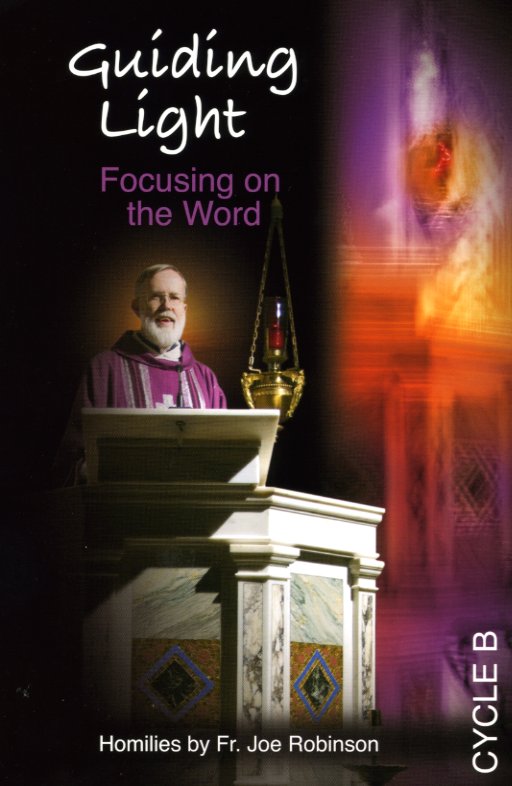
R. Fr. Joe says this in Cycle B Book
First Sunday of Lent
(Gen. 9, 8-15; I Peter 3, 18-22; Mark 1, 12-15) We’re going to hear the word "covenant" quite often in the next few Sundays. Today’s first reading is about the covenant God made with Noah and his descendants which, according to the story, included all of us - the entire human race. A normal covenant would include promises two parties made to one another and expectations that the separate parties had of one another. The covenant God made with Noah is a one sided covenant in that God simply promises that he would never destroy the world by flood again, while he asks nothing of Noah in return. God gave the rainbow as a sign of his commitment to this covenant. St. Peter, in the second reading reminds us of a covenant God made with us at baptism. God would share his own life with us and our parents promised for us, or we ourselves promised if we were old enough, that we would be obedient and faithful sons and daughters of our Father, God. If we were too young to make those promises ourselves, as we grow older we have to make our own personal commitment to God if we hope to share in the blessings of God’s covenant with us. One special sign God has given us to help us reaffirm our covenant with him is the Eucharist. [We have seven people from our parish who are making an important journey to enter into or to deepen their covenant with God through the Catholic Church. We are happy to have them with us. After the Prayer of the Faithful, we can send them off with our prayers to participate in the rite of election with the Archbishop this evening.]March 5, 2006
INTRODUCTION
Seventh Sunday in
Ordinary Time
February 19, 2006
HOMILY: I will begin with a true story. A man I knew was away from prayer, the Mass and the sacraments for a long time. He was also having problems with his marriage and with his work. Someone at work told him to read the Bible and it would help him. In desperation and as a last resort he picked up his bible and started reading. One idea began to emerge as he read through the Jewish history he found in the Old Testament. He noticed how many times the point was made that when the Jews forgot about God, things went badly for them. The Babylonian exile itself was the direct result of their having done exactly the opposite of what God told them to do. The man I’m telling you about concluded after reading the Bible that maybe things would go better for him if he got himself straightened out spiritually. So he did, and he told me both his marriage problems and his job situation improved beyond his expectations. More than that he was now at peace with himself.
In a similar way, Jesus in today’s gospel put this man right with God before he gave him physical health. Not all sickness and suffering is indicative of a spiritual life that is ailing. But in the case of the paralytic, perhaps Jesus saw the one was somehow connected with the other.
Many people have the attitude that our health, our work, our family relationships have nothing to do with our relationship with God. They go to church on Sunday (if they do that much) then do as they please the rest of the week. Our faith teaches us all these areas of our lives are interconnected. In psychology there is a whole field of study called psychoneuro-immunology (I love that word – it makes me sound smart to say it!). This is also known as the mind-body connection. Our attitudes, beliefs, values, emotions can and do affect our health. And they affect how we deal with those we work with, live with and relate to. It might sound as if I’ve become a Christian Science minister if I say sin might cause sickness or suffering. I think sin is at the root of a lot of suffering in the world, suffering we bring on ourselves or suffering we cause others.
You know, in our journey through life, we all struggle with problems of one sort or another at times. It may be sickness. It may be the loss of a loved one. It may be inner turmoil. It may be caused by the cruelty or mistake of another. It doesn’t matter whether a person is very holy or a terrible sinner, we’re going to have difficulties. And I do not believe God uses sickness or suffering to punish us. Sometimes he might give us a push in the right direction, but life has enough problems of its own that God doesn’t have to add to them. Our faith can bring us a lot of additional strength to deal with troubles. If we’re not living the way God has taught us, we are going to add to our troubles. I say this simply because I believe God wants the best for us, and when we go in directions opposed to the way he has shown us, we are going against our own best self interest. Sin will affect us and it can paralyze us in many ways.
Although God condemns sin, God is merciful to the sinner and today’s gospel gives us a message of hope. Christ came to save us from all those powers that want to pull us down, including sickness and death. If we find ourselves paralyzed in our relationship with God, Jesus is willing to help. He’s always ready to extend mercy and help to those who come to him. And we don’t have to tear the roof off of the church to get to him.
6th
Sunday in Ordinary Time
February 12, 2006
HOMILY: I announced that today I would anoint the sick after Mass. I thought it was a good day to offer this sacrament because the gospel was about Jesus healing someone. However, in view of the weather, probably many of the people who would have come to be anointed decided to stay home. But there will be other opportunities after the weather turns a little warmer.
I administer the anointing of the sick to everyone I visit in the hospital or nursing home or to anyone I visit who is a shut-in. I make use of it frequently. I believe in the power of prayer and I believe in the power of this sacrament for the sick.
Recently I anointed a friend of mine who was going into the hospital. He was brought up in the old school when this sacrament was called Extreme Unction and he was a bit shocked when I suggested giving him the anointing. I don’t think my explanation that this is a prayer and sacrament for the sick gave him much reassurance, because after I left him, he told his friends “I just received the last rites!” He might have thought he was a goner, but he wasn’t. He’s quite healthy today.
It was the Second Vatican Council that restored this sacrament to its original purpose: a prayer and sacrament for healing. Healing was part of Jesus’ mission and also that of the disciples. When Jesus sent his disciples to help him in his work, St. Mark tells us they preached that people should turn away from their sins, they cast out demons and anointed many with oil and healed them. Even when physical healing is not the outcome, there is always some unique blessing and grace that comes with the sacrament.
Science had been pretty skeptical about faith and prayer until recently. Prayer is one of the liveliest areas of research in the field of alternative medicine today. For the past 15 or 20 years, science has started looking upon prayer more positively. Ten years ago Dr. Larry Dossey, a surgeon from Texas who didn’t believe much in prayer for healing, started reviewing all the research on it and he ended up writing the book Healing Words. He concluded that prayer should be included with the prescriptions doctors write. An example of a more recent study was reported in October last year in Prevention Magazine. Dr. Mitchel Krucoff, a cardiologist at Duke University did a study with 150 men with heart problems. He concluded that, compared with a control group, those who were prayed for had a 50% reduction in heartbeat abnormalities and a 100% reduction in clinical outcomes such as heart attacks and heart failure. And none of the patients, their families, or the doctors treating them knew who was in the group being prayed for. I could bore you with other studies, but these studies appeal to the scientific side of my personality, because although I have faith in the power of prayer, I also had a good background in the scientific method when I studied experimental psychology.
So when I tell you prayer works, it’s not just from what I believe, it’s not just from what I have personally experienced (and I have had many personal experiences of the power of prayer), but I can support it from scientific research. It works. At the same time it is mysterious. We can’t always control the outcome. And most of all, it doesn’t happen as fast as we would like or as fast as it happens in the gospels. One thing Jesus kept telling us over and over is to keep praying, to keep knocking. I think when we give up too soon, it shows we don’t have very much faith in what prayer has the power to do for us. And we have to remember, when we pray, we are not dealing with inert substances, like using antibiotics to cure a bacterial infection. When we pray we are talking to our God whose wisdom and love is infinitely beyond our own. “Sometimes, God's operating from a larger script than yours,” Dr. Frederick Flach says. Prayers are answered in many ways. On some occasions God may use illness for a purpose we do not understand. On other occasions, God may intervene directly and on still other occasions God may work through others, especially health care professionals. Although I’ve seen prayer bring immediate results, more times than not, it works better when we don’t give up praying but keep at it. Keep knocking with faith. “Lord, if you want to, you can cure me.”
4th
Sunday in Ordinary Time
January 29, 2006
HOMILY: St. Mark’s gospel is the shortest of the gospels and St. Mark doesn’t spend any time with preliminaries. He opens his gospel with a few words about John the Baptist, then he tells us briefly about Jesus’ baptism and his fasting and temptation in the desert. Last week we heard about Jesus beginning to gather his apostles and today we hear Jesus is already busy teaching and healing. And we’re only at verse 21 in Mark’s first chapter. St. Mark even skips past whatever it was Jesus was preaching about to get right to where the action is. Jesus comes out on the offensive, attacking the powers of evil. Notice it was on the Sabbath, the day the Jews celebrated God delivering his people from slavery. So it’s appropriate that on this particular Sabbath, the man in the gospel was set free from slavery to the devil.
I have prayed many times over people who felt the devil had some power over them. I’ve never had such a dramatic experience as St. Mark describes here (people convulsing, crying out, sometimes falling down). I have read about people who have. The movie The Exorcist, which many people may have seen, was based on a true story of an exorcism. It’s interesting how popular angels are right now and how unpopular it is to believe in the devil. It’s especially interesting that so many people have this attitude when there is so much evil in the world around us. Personally I believe in good angels, but I find it much easier to believe in the bad ones. I think there’s so much more evidence of their existence. Our ignoring the presence of the devil gives the devil greater freedom to do his or her thing. The smartest strategy a devil can use is to convince us that he or she is not around. St. Peter tells us “your enemy, the devil, roams around like a roaring lion, looking for someone to devour. Be firm in your faith and resist him.” (1 Peter 5, 8-9) Although some instances of what was considered demon possession at the time of Jesus may have been psychological or physical (such as epilepsy), the gospels do take the devil seriously and Jesus did too. When I am asked to pray over someone who thinks they are under demonic power, I always try to rule out psychological problems. If I think it is warranted, I do suggest a psychologist or psychiatrist for them to see, but at times I have felt there was an evil power at work in their lives that went beyond psychology.
Notice the devil recognized Jesus immediately as the Son of God: “the Holy One of God.” Devils may not be good but they are very smart. It’s not until the end of St. Mark’s gospel, as Jesus dies on the cross, that any human person recognizes who Jesus really is. And that person was a pagan, a Roman centurian, who after seeing Jesus die, said: “Truly, this man was the Son of God.” It took people a long time to find out who Jesus was, the devil recognized it immediately. St. Mark tells us when Jesus taught the people and healed the possessed man his audience was spellbound and filled with awe.
The gospels not only tell us about Jesus, they tell us also about ourselves. What is the gospel telling us about ourselves today? It is asking us: how do we react to Jesus? Are we filled with wonder and awe when we hear him or think of him. Aesop told us over 2500 years ago: “Familiarity breeds contempt.” Maybe we don’t have contempt of our Lord, but after hearing about him for many years, our sense of awe and wonder can get dulled. How do we rekindle that excitement of hearing about him again? One way I know of is not to think we know all there is to know about him. We have to keep discovering more and more about him. Jesus is the infinite Son of God and whatever we know about him is just a tiny little bit compared to what we have yet to discover. We can only do that through prayer. Today we pray the greatest prayer there is, a prayer Jesus himself gave us at the Last Supper. But our prayer life has to include more than just one hour a week in church. It must continue through the week. If Mass is the only prayer we pray all week, the Mass itself will become boring and dry.
Another way to recapture that sense of awe in Jesus is to praise him. Too often our prayers are limited to asking God for things we need or want. And that’s good. But praise is also an important part of prayer and praise helps to lift our hearts to a sense of wonder as we come before our God. In Mass today we try to capture that sense of wonder and awe through the selection of hymns of praise. We praise God who has come to teach us and to help us with our everyday struggles with life and with the powers of evil around us.
3rd
Sunday in Ordinary Time
January 22, 2006 (excerpt)
HOMILY: ... This is why God sent his Son to us, to teach us and guide us. “The time has come,” he said as he began his public ministry. “The Kingdom of God is near. Turn away from your sins and believe in this good news.” As we heard in today’s gospel, Jesus needed help to announce this good news so he started choosing people who would help him.
Jesus said “I came that they may have life and may have it to the full.” Jesus’ teachings are good news. Sometimes, though, it doesn’t feel that way. Forgiving people who have hurt us, loving our enemies, getting up on Sunday morning when we’re tired, keeping the commandments, giving some of our hard earned money to others; sometimes it doesn’t feel like good news. That’s why he said, “believe in this good news,” because we don’t always feel it.
Turn away from sin is part of his message. “Turn away from sin” is the translation of a word from the Greek: μετάνοια which means a change of mind. Generally it is translated repentance or conversion. Jesus is telling us if we’re going to start believing in what he tells us we have to change our mind, to stop thinking and believing and doing what we used to.
Of course the reason we are here is because we do believe in Christ. But unless there’s a Mother Theresa among us, I suspect there is room for improvement in most of us. Jesus’ call to conversion is sort of like New Year’s resolutions. We make New Year’s resolutions because we realize we can do better, we can be better, we have more potential than we are using.
Until we hopefully reach heaven where we will be perfect, there’ll always be room for improvement, always be some areas of our lives where the gospel of Jesus has not yet penetrated. Would that conversion were as easy as the book of Jonah pictures it. If it were, we wouldn’t have to be reminded of it so often. Amen.
2nd
Sunday in Ordinary Time
January 15, 2006
(I Sam. 3,3b-10.19; Jn. 1,35-42) Once while I was at another parish I went to visit a lady in the hospital. She was the mother of a large number of children (more than ten), several of them still in grade school. In our visit she disclosed to me that she thought she had a vocation to be a nun. It was both humorous and sad, sad that she was so seriously detached from real life and humorous because with all those children underfoot, I could see why she wanted to get away from it all.
My point is that not every time we think we’re getting a call from God is it really God calling us. Often when he really does call us, his call is not so easy to discern, or if we discern where it’s coming from, we’re not so quick to follow. For example, Moses was in no hurry to take on the job God was asking him to do, even though the message came with unmistakable clarity. Samuel, on the other hand, kept hearing God call, but didn’t know it was God. It was his mentor, the high priest, Eli, who helped him know God’s voice. When I felt God calling me to be a priest, I was excited about the idea until I reached puberty. Then I was hoping the idea would go away, but God kept calling like he did with Samuel. The call to the apostles seems to have taken place over the course of time, as they found themselves attracted by Jesus’ powerful personality. We see in today’s gospel that God’s call does not always come out of the heavens but from another human being. The call to Andrew and an unnamed apostle (probably John) came from John the Baptist. Peter’s call started with Andrew. It took a while after meeting Jesus before they gave up their lucrative business in order to be Jesus’ disciple or as that word means, Jesus’ student.
When God’s calls, we seldom know what we are getting ourselves into if we follow that call. Samuel didn’t know that he would become a leader for God’s people, that he would be a prophet and priest, that he would lead the Israelites into battle, and that he would raise up and depose kings. Mary, the mother of Jesus, didn’t know what she was in for when she said “yes” to God. Nor did the apostles know that they would have to give up more than their fishing business, and that following Jesus would cost them their lives. Mother Teresa felt called to be a nun and started her vocation in the classroom. After almost 20 years of teaching she received what she described as a “call within the call” when she felt called to serve the poorest of the poor and start a new religious order. Martin Luther King could not have had any idea when he was in the seminary and getting “C’s” in public speaking that he would be threatened daily, that he would be imprisoned for standing up for justice, that he would be facing angry crowds with equanimity and prayer for his persecutors, that he would one day be leading 200,000 people to the nation’s capital to dramatize that all of America’s citizens are endowed with certain unalienable rights, among which are life, liberty and the pursuit of happiness. Nor did he know that an assassin’s bullet would end his life at age 39. If I had known when I entered the seminary some of the difficulties I would have to deal with as a priest, I would have said, “God, I can’t do that. Find someone else.” I’m glad I didn’t know, I’m glad God was with me during hard times, and I’m glad I followed his call.
God’s call sometimes disrupts our comfortable lives. But if God wants us he’ll keep calling, like he did Samuel, as long as there’s a chance we might respond. Sometimes we need help in knowing what God’s saying, sometimes we need to be pointed in the right direction, sometimes we need confirmation from others. For example, when I went to the seminary, the rector and staff didn’t assume that I really had a calling. We had to go through nine years of schooling and a lot of scrutiny before ordination. When the lady in the hospital with all the kids told me she felt called to be a nun, I couldn’t support her. Instead I reminded her that her real vocation was to take care of her children.
I think it’s extremely important to notice that Samuel was already in God’s presence at the place where the Arc of the Covenant was being kept, and it was in the quiet of the night he heard the Lord. Almost every time I have heard the Lord speaking to me, it was when I was praying, reading the Scriptures or meditating.
Our environment calls to us from so many directions: TV, radio, e-mail, cell phones, beepers, billboards, etc., etc. A lot of times God gets put on hold so we can listen to a call from somewhere else. If we want to hear the Lord, we have to put all other voices on hold so God can get through. The only way we can do that is to set time aside. I have a phrase I use for myself all the time regarding prayer: “if you don’t schedule it in, you schedule it out.” We have to make time for the Lord if we’re really going to hear him, and if we don’t, we won’t. Amen.
We need funds for the mailing
of Fr. Joe's book
Our Lord wants out.
Call 1-888-211-3041
We need to
print the
Tiny Tot Rosary Books.
Can anyone please help us with the this?
1-888-211-3041

$1.00 plus shipping
| Rita Ring |
|
||||||||||||||||||||||||||||||||||||||||||||||||||||||||||||||||||||||||||||||||||||||||||||||||||||||||||||||||||||||||||||||||||||||||||||||||||||||||||||||
| Fr. Joe Robinson |
|
|
|
|
|
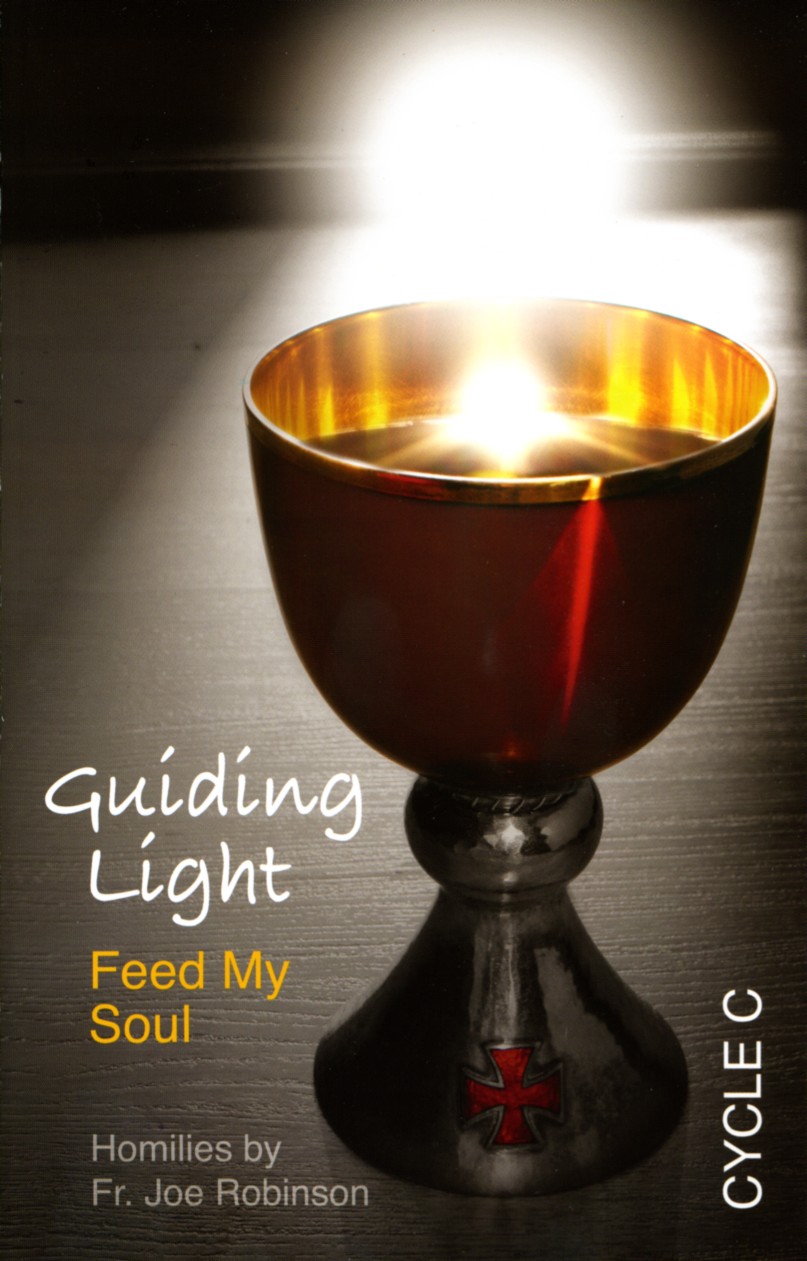
|
|
|
|

|
|
|
|
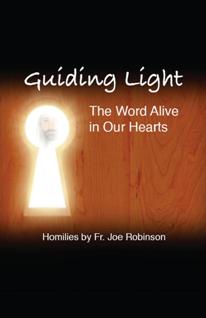
|
|
|
|
| Fr. Edward J. Carter |
|
||||||||||||||||||||||||||||||||||||||||||||||||||||||||||||||||||||||||||||||||||||
|
|||||||||||||||||||||||||||||||||||||||||||||||||||||||||||||||||||||||||||||||
|
||||||||||||||||||||||||||||||||||||||||||||||||||||||||||||||||||||||||||||||||||||||||||||||||
Get a canvas print of Mary's image
with a sliver of glass and
a little bottle of
Jesus and Mary water.The glass will be fixed behind the
back of the picture.Cost — $200.00
Also available
a cup with a Mary's image on it
Cost — $15
Call Doris
1-888-211-3041
or
1-727-725-9312
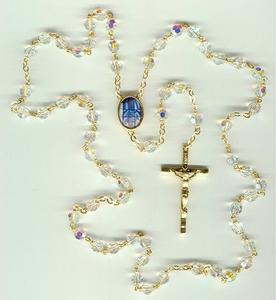
Rosaries with Mary's Image Available
Aurora Borealis Beads6mm - $30.00
8mm - $40.00
Call Doris
1-888-211-3041
or
1-727-725-9312
Statues
Sacred Heart of Jesus w/glass - 18
Our Lady-Guadalupe w/glass - 12
Limpias - 8
Immaculate Heart w/glass - 18
I Heart - Ivory w/glass - 18
Our Lady of Grace w/glass - 18
Our Lady-Mt. Carmel w/glass - 18
Our Lady of Lourdes w/glass - 18
Infant of Prague w/glass - 24
Sacred Heart of Jesus w/glass - 24
Sacred Heart -Blessing w/glass - 24
Sorrowful Mother w/glass - 24
I Heart - Ivory w/glass - 24
I Heart of Mary w/glass - 24
Our Lady of Lourdes w/glass - 24
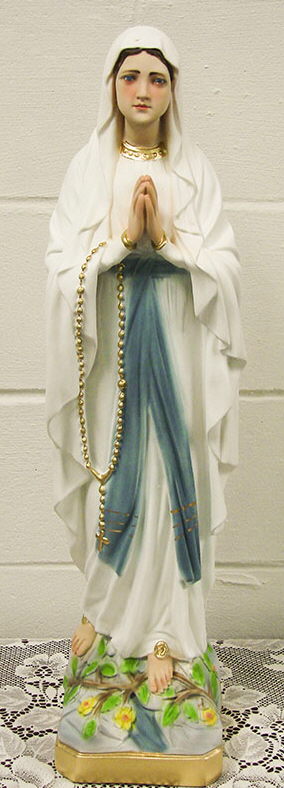
Our Lady-Guadalupe w/glass - 28
Our Lady of Grace w/glass - 24
Our Lady-Mt. Carmel w/glass - 24
St. Padre Pio
St. Joseph
St. Therese
St. Francis
St. Anthony
St. Claire
Limpias
St. Jude
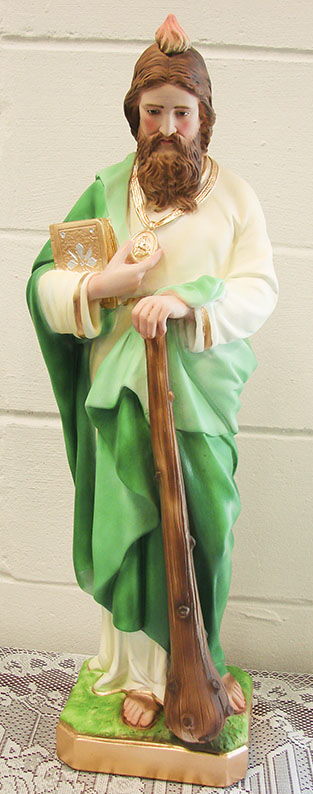
Divine Mercy
Holy Family
Angel
St. Philomena
Pieta - Marble
Pieta - Color
Holy Family
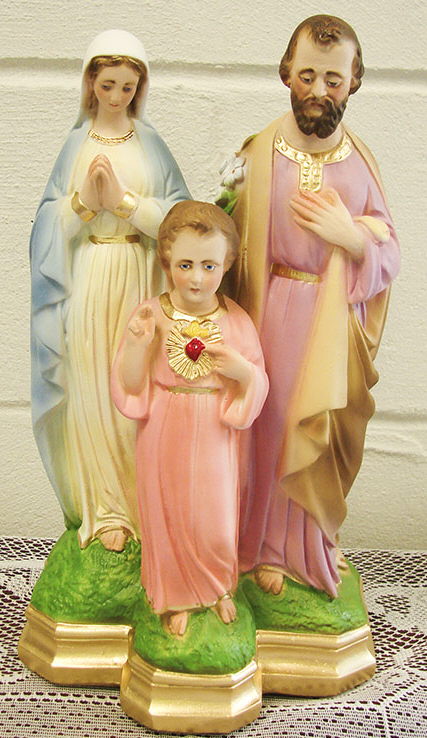
St. Anthony - 18
St. Francis - 18
St. Joseph - 18
St. Therese - 18
St. Rita - 18
St. Clare - 12
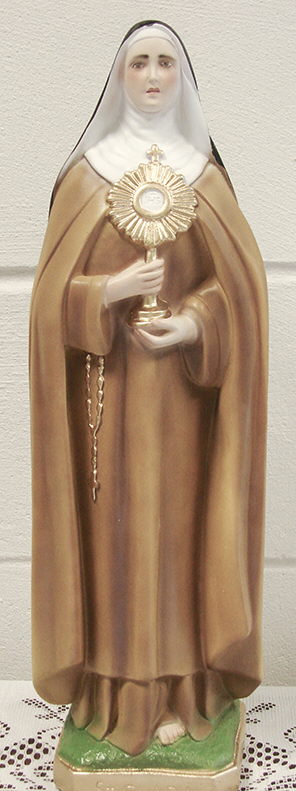
St. Rita - 12
St. Padre Pio - 12
Divine Mercy - 12
St. Michael - 11
Shepherds of Christ Ministries
P. O. Box 627
China, IN 47250
Toll free - 1-888-211-3041
Local - 1-812-273-8405
fax - 1-812-273-3182
web: www.sofc.org
e-mail: info@sofc.org
Size Price Quantity Holy Family
24"
$180
Limpias
24"
$125
St. Anthony
24"
$125
St. Claire
24"
$125
St. Francis
24"
$125
St. Joseph
24"
$125
St. Jude
24"
$125
St. Padre Pio
24"
$125
St. Therese
24"
$125
Divine Mercy 22"
$125 Angel 22"
$100 St. Philomena 20"
$100 St. Philomena 16"
$65 St. Joseph 18"
$65 St. Francis 18"
$65 St. Anthony 18"
$65 St. Rita 18"
$65 St. Therese 18"
$65 Pieta - Color 15" $75 Pieta - Marble 15" $75 Holy Family 12"
$60 St. Padre Pio - standing 12"
$40 St. Padre Pio - sitting 8"
$50 St. Michael 11"
$40 St. Rita 12"
$40 Divine Mercy
12"
$40 St. Claire 12"
$40 Limpias 8"
$25 Our Lady of Guadalupe w/glass 28"
$500 Our Lady of Mt. Carmel w/glass 24"
$500 Immaculate Heart of Mary w/glass
24"
$500 Immaculate Heart - Ivory w/glass
24"
$500 Infant of Prague w/glass
24"
$500 Our Lady of Grace w/glass
24"
$500 Our Lady of Lourdes w/glass
24"
$500 Sacred Heart of Jesus w/glass 24"
$500 Sacred Heart -Blessing w/glass 24"
$500 Sorrowful Mother w/glass
24"
$500 Immaculate Heart of Mary w/glass 18"
$300 Immaculate Heart - Ivory w/glass 18"
$300 Sacred Heart of Jesus w/glass 18"
$300 Our Lady of Lourdes w/glass 18"
$300 Our Lady of Grace w/glass 18"
$300 Our Lady of Mt. Carmel w/glass
18" $300 Our Lady of Guadalupe w/glass 12"
$200 Fatima w/glass
11"
$150 Fatima w/glass
18"
$250 Pilgrim Virgin w/glass 12"
$160 Pilgrim Virgin w/glass 15" $200 Pilgrim Virgin w/glass 18" $250 Pilgrim Virgin w/glass 27"
$450
Call for Shipping Price (1-888-211-3041)
Name
Sub-Total Address
IN Tax (7%) City
Shipping State Zip
Donation Telephone
Order Total
Call Doris
1-888-211-3041
or
1-727-725-9312
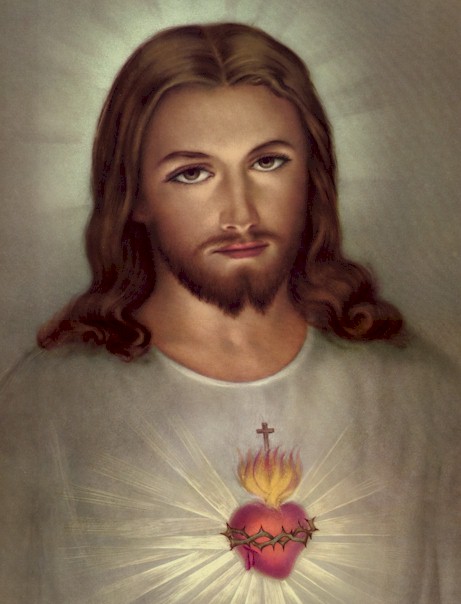
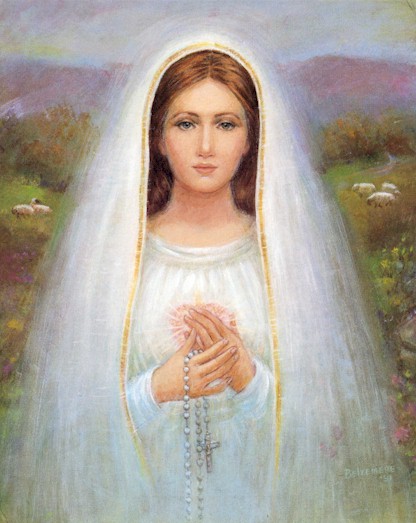
Immaculate Heart and Sacred Heart Pictures Available
with & without frames - different sizes available
Call Doris
1-888-211-3041
or
1-727-725-9312
 Copyright
© 2011 Shepherds of Christ.
Copyright
© 2011 Shepherds of Christ.
Rights for non-commercial
reproduction granted:
May be copied in its entirety, but neither re-typed nor edited.
Translations are welcome but they must be reviewed for moral and
theological accuracy by a source approved by Shepherds of Christ Ministries
before any distribution takes place. Please contact us for more information.
All scripture quotes are from the
New Jerusalem Bible, July 1990, published by Doubleday.
Revised: January 1, 2011
URL: http://www.sofc.org
Contact Information for Shepherds
of Christ
Email: info@SofC.org
Shepherds of Christ Ministries
P.O. Box 627
China, Indiana 47250
Telephone: (toll free) 1-888-211-3041 or (812) 273-8405
FAX: (812) 273-3182